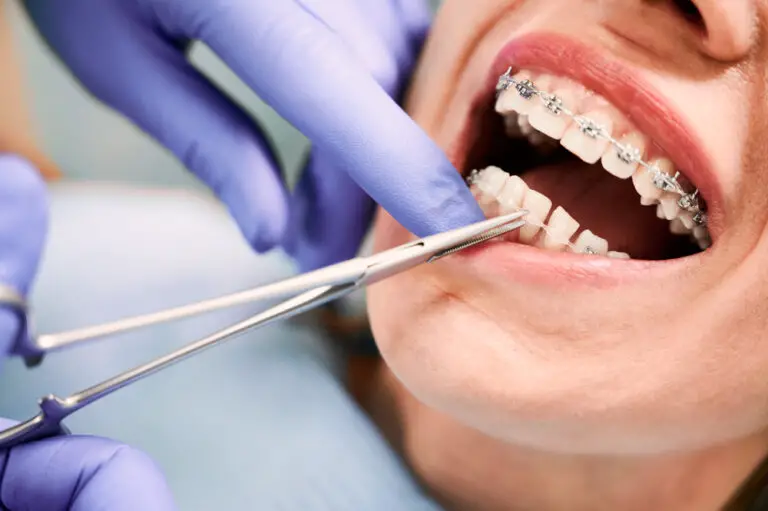Are you experiencing severe tooth pain that seems to linger even after the stimulus is gone? Do you have sensitivity to hot or cold, or a swelling on your gums that resembles a pimple? If so, you may need a root canal.
Root canal therapy is necessary when oral bacteria invade the pulp inside of your tooth. This usually happens when a cavity is left untreated for a long time, or if your tooth becomes cracked or damaged due to trauma. The damage to a tooth that may need a root canal can cause severe tooth pain, especially when biting or chewing.
Root canal procedures are commonly thought to be the most painful kind of dental treatment, but studies have found that only 17 percent of people who’ve had a root canal described it as their “most painful” dental experience. With dental advances and local anesthetics, most people have little if any pain during a root canal. So, if you’re experiencing tooth pain, don’t hesitate to visit your dentist and find out if a root canal is necessary to alleviate your discomfort.
Understanding Tooth Pain
If you are experiencing tooth pain, it can be difficult to determine the cause and severity of the discomfort. Tooth pain can range from mild sensitivity to severe pain that affects your daily life. Understanding the causes and symptoms of tooth pain can help you determine when it is time to seek dental treatment.
Causes of Tooth Pain
Tooth pain can be caused by a variety of factors, including:
- Tooth decay: When bacteria in your mouth produce acid that erodes the enamel of your teeth, it can lead to cavities and tooth pain.
- Gum disease: If you have gum disease, your gums can become inflamed and infected, leading to tooth pain.
- Tooth trauma: If you have experienced trauma to your tooth, such as a crack or fracture, it can cause pain and sensitivity.
- Tooth abscess: An abscessed tooth is a serious condition that occurs when the pulp of your tooth becomes infected. This can cause severe pain and swelling.
Symptoms of Severe Tooth Pain
Severe tooth pain can be a sign of a serious dental problem that requires immediate attention. Some symptoms of severe tooth pain include:
- Persistent pain that does not go away after taking pain medication
- Pain that worsens when you bite down or chew
- Sensitivity to hot or cold temperatures
- Swelling in your gums or face
- Fever or chills
If you are experiencing any of these symptoms, it is important to seek dental treatment as soon as possible. Your dentist can determine the cause of your tooth pain and recommend the appropriate treatment, which may include a root canal.
Remember, tooth pain is not something you should ignore. If you are experiencing discomfort, it is important to seek dental care to prevent further damage and ensure your overall oral health.
What is a Root Canal

If you have been experiencing tooth pain, your dentist may have recommended a root canal. This dental procedure is used to treat a tooth that has become infected or inflamed.
Procedure of a Root Canal
During a root canal, the dentist will remove the infected or inflamed pulp from inside the tooth. The pulp is a soft tissue that contains nerves and blood vessels. The dentist will then clean and disinfect the inside of the tooth before filling it with a special material to seal the space. Finally, a crown or filling will be placed on top of the tooth to protect it and restore its function.
The procedure is usually done in one or two visits to the dentist’s office and is performed under local anesthesia, which means you will be awake but won’t feel any pain.
Why a Root Canal is Needed
A root canal is needed when the pulp inside a tooth becomes infected or inflamed. This can happen due to a variety of reasons, including:
- Deep decay
- Repeated dental procedures on the same tooth
- A cracked or chipped tooth
- Trauma to the tooth
If left untreated, an infected or inflamed tooth can cause severe pain, abscesses, and other serious complications. By getting a root canal, you can save your tooth and prevent further damage to your oral health.
In summary, a root canal is a dental procedure that is used to treat an infected or inflamed tooth. By removing the damaged pulp and sealing the space, the dentist can save the tooth and prevent further complications.
Tooth Pain Before a Root Canal
If you are experiencing severe tooth pain, especially when biting or chewing, it could be a sign that you need a root canal. Tooth pain can be caused by a variety of factors, including tooth decay, trauma, or infection. In some cases, the pain may be so severe that it can interfere with your daily activities.
Severity of Pain
The severity of tooth pain can vary depending on the underlying cause. If the pain is caused by tooth decay or trauma, it may be a dull ache or throbbing pain that is constant. On the other hand, if the pain is caused by an infection, it may be a sharp, shooting pain that comes and goes.
In some cases, the pain may be so severe that it can cause swelling in the gums and face. If you notice any swelling, it is important to seek treatment as soon as possible to prevent the infection from spreading.
Duration of Pain
The duration of tooth pain can also vary depending on the underlying cause. If the pain is caused by tooth decay or trauma, it may be a chronic issue that lasts for weeks or even months. However, if the pain is caused by an infection, it may come and go, with periods of intense pain followed by periods of relief.
If you are experiencing tooth pain that lasts for more than a few days, it is important to seek treatment from a dentist. A root canal may be necessary to remove the infected pulp and alleviate the pain.
In conclusion, tooth pain before a root canal can be severe and long-lasting. If you are experiencing tooth pain, it is important to seek treatment from a dentist to determine the underlying cause and receive appropriate treatment.
Managing Tooth Pain Before a Root Canal
If you are experiencing severe tooth pain, it could be a sign that you need a root canal. While waiting for your appointment, there are several ways to manage the pain.
Pain Relief Methods
- Over-the-counter pain relievers such as ibuprofen or acetaminophen can help alleviate pain. Follow the instructions on the label and do not exceed the recommended dose.
- Applying a cold compress to the affected area can help reduce swelling and numb the pain.
- Avoid eating hard or crunchy foods that can aggravate the affected tooth. Stick to soft foods such as soup, yogurt, and mashed potatoes.
- Rinse your mouth with warm saltwater to help reduce inflammation and promote healing.
When to See a Dentist
If the pain is severe and persists despite pain relief methods, it is important to see a dentist as soon as possible. Delaying treatment can lead to further damage and potentially more extensive and expensive procedures.
Your dentist will perform a thorough examination and take x-rays to determine the extent of the damage. They may prescribe antibiotics to treat any infection and recommend pain management techniques until the root canal procedure can be performed.
Remember, while managing tooth pain before a root canal can be uncomfortable, it is important to prioritize your dental health and seek professional treatment as soon as possible.
Preventing Severe Tooth Pain

If you want to avoid experiencing severe tooth pain that may require a root canal, there are a few things you can do to prevent it. By following these oral hygiene practices and getting regular dental check-ups, you can keep your teeth healthy and prevent tooth decay and infections.
Oral Hygiene Practices
One of the most important things you can do to prevent severe tooth pain is to practice good oral hygiene. This includes brushing your teeth at least twice a day, flossing daily, and using mouthwash to kill bacteria and freshen your breath.
When you brush your teeth, make sure you use a fluoride toothpaste and brush for at least two minutes. Brush all surfaces of your teeth, including the fronts, backs, and tops. Use a soft-bristled brush and brush gently to avoid damaging your gums.
Flossing is also important for removing food particles and plaque from between your teeth. Make sure you floss every day, and use a clean section of floss for each tooth.
Regular Dental Check-ups
In addition to practicing good oral hygiene at home, it’s also important to see your dentist regularly for check-ups and cleanings. Your dentist can spot early signs of tooth decay and gum disease and treat them before they progress and cause severe pain.
During your check-up, your dentist will examine your teeth and gums and may take X-rays to check for any hidden problems. They will also clean your teeth to remove any plaque and tartar buildup.
By following these oral hygiene practices and getting regular dental check-ups, you can prevent severe tooth pain and avoid the need for a root canal. So make sure you take care of your teeth and see your dentist regularly to keep your smile healthy and pain-free.
Frequently Asked Questions
How can I relieve pain before getting a root canal?
If you are experiencing pain before your root canal appointment, there are a few things you can do to help relieve the discomfort. Over-the-counter pain medication such as ibuprofen or acetaminophen can help reduce pain and inflammation. Applying a cold compress to the affected area can also provide relief. Be sure to avoid chewing on the affected tooth and stick to soft foods until your root canal treatment.
What are the symptoms of needing a root canal?
The symptoms of needing a root canal can vary, but some common signs include severe tooth pain, sensitivity to hot and cold temperatures, swelling and tenderness in the gums, and discoloration of the affected tooth. If you are experiencing any of these symptoms, it is important to schedule an appointment with your dentist as soon as possible.
Can a tooth heal itself without a root canal?
In some cases, a tooth may be able to heal itself without the need for a root canal. If the tooth is only slightly damaged or has a small cavity, it may be able to heal with the help of a dental filling. However, if the damage is severe or the infection has spread to the pulp of the tooth, a root canal may be necessary to save the tooth.
How long does root canal pain last?
It is normal to experience some discomfort for a few days after a root canal procedure. However, the pain should gradually subside over the course of a week or two. If you are experiencing severe or prolonged pain after your root canal, be sure to contact your dentist.
Is it normal to have jaw pain before a root canal?
Jaw pain can be a symptom of needing a root canal, but it is not always present. If you are experiencing jaw pain along with other symptoms such as tooth pain or sensitivity, it is important to schedule an appointment with your dentist.
What are some home remedies for root canal pain relief?
While there is no substitute for professional dental care, there are a few home remedies that can help relieve root canal pain. Applying a cold compress to the affected area can help reduce inflammation and relieve pain. Over-the-counter pain medication such as ibuprofen or acetaminophen can also help alleviate discomfort. Be sure to avoid chewing on the affected tooth and stick to soft foods until your root canal treatment.







